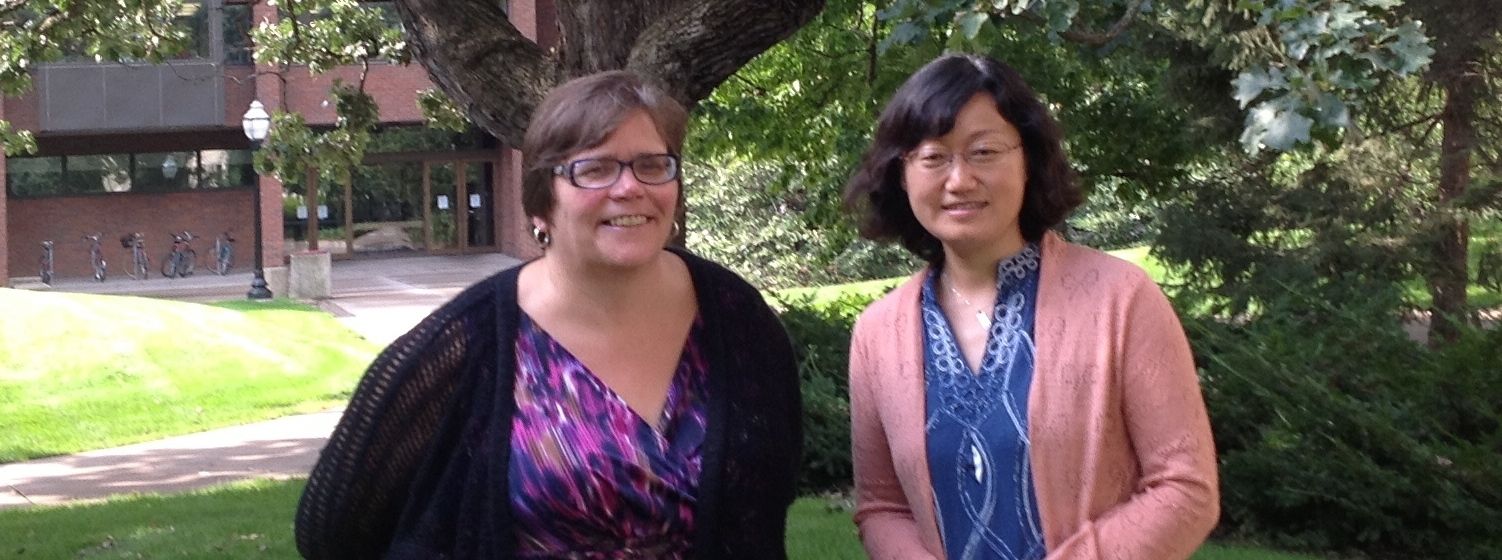
When student protests erupted in Tiananmen Square, Jill Trites was only 146 kilometers away in Tianjin. While the People’s Republic of China may seem an unlikely location to find a young woman from Pelican Rapids, Minnesota, Trites’ life is richly woven with unique international teaching, learning and service work experiences.
As a town kid raised in a farming and resort community, Trites, now a senior teaching specialist in the Department of Postsecondary Teaching and Learning, embraced the rhythm of new faces and population swell that arrived each summer. “I met people who encouraged me to try new things,” recalls Trites. The fourth of five children, Trites followed in her siblings’ footsteps, complying with her parents’ desire that she attend a local, state college. At Minnesota State University, Moorhead, Trites made friends who broadened her already open mind. “One friend from Hong Kong challenged me to learn Chinese, so I did,” she says. Studying the Chinese language, led to a study abroad scholarship. After one semester in the People’s Republic of China, Trites elected to stay for a second. It was the spring of 1989, and the student protests for democracy had just begun. “The open broadcasting from Tiananmen Square was a great turning point,” says Trites.
The study abroad semesters were a springboard for Trites. In addition to earning a Bachelor of Science in chemistry, Chinese and communications from Moorhead, and a Master of Arts in teaching English as a second language from the University of Minnesota, Trites holds a Certificate in Chinese language and linguistics from Nankai University, Tianjin in the People’s Republic of China. Her international work includes teaching English at Nankai University and Tianjin University in the People’s Republic of China and cultural orientation courses for the International Organization for Migration (IOM) in Nairobi, Kenya. During the summers of 2008-2012, she traveled to Mozambique, in southeast Africa, to volunteer as an English teacher to elementary, middle school, and high school students, and facilitate teacher-training sessions for early childhood educators and primary school teachers.
The University of Minnesota acknowledged Trites’ dedication to international education by selecting her for the 2014-2015 Internationalizing Teaching and Learning (ITL) Cohort and ITL Fellows programs. “I’ve been working with international students one way or another since 1990,” says Trites. But after meeting with her multidisciplinary cohort in January 2015, Trites displayed the humility of a person committed to lifelong learning. “I realize how far I have to go in developing activities that help build awareness for problem-solving and decision-making as part of a global community.”
Trites was also selected to participate in the University’s Collaborative Online International Learning (COIL) Cohort program. For someone who values being on the cutting edge of international education, Trites sees COIL as an exciting, new challenge: one that may give her students a chance to connect with Chinese peers in a way that was impossible in 1989. To develop her COIL course, Trites plans to partner with Joy Song, a professor of English Education from Qingdao University, who was a visiting scholar at the University last year. The ambitious undertaking involves more than developing curriculum, together Trites and Song must navigate disparate technologies, cultural norms, student expectations as well as a twelve-hour time difference. “We’ll have to be open, flexible and adapt as we go,” says Trites. Despite the extensive coordination, Trites believes a COIL course can yield tremendous benefits. “Only fifty percent of students have access to a learning abroad program. For some students, this is the only international learning opportunity they may ever have,” says Trites. “It might be rough at times, but we have to try.”
To help gather information and connections that support her COIL course development, Trites will attend the SUNY COIL Center’s 7th annual conference March 19 – 20, 2015. As the leading international event in the field, the COIL conference brings together 250+ faculty, international programs staff, instructional technology staff, and university and college administrators from SUNY, across the U.S. and around the world to celebrate innovative models and best practices.



